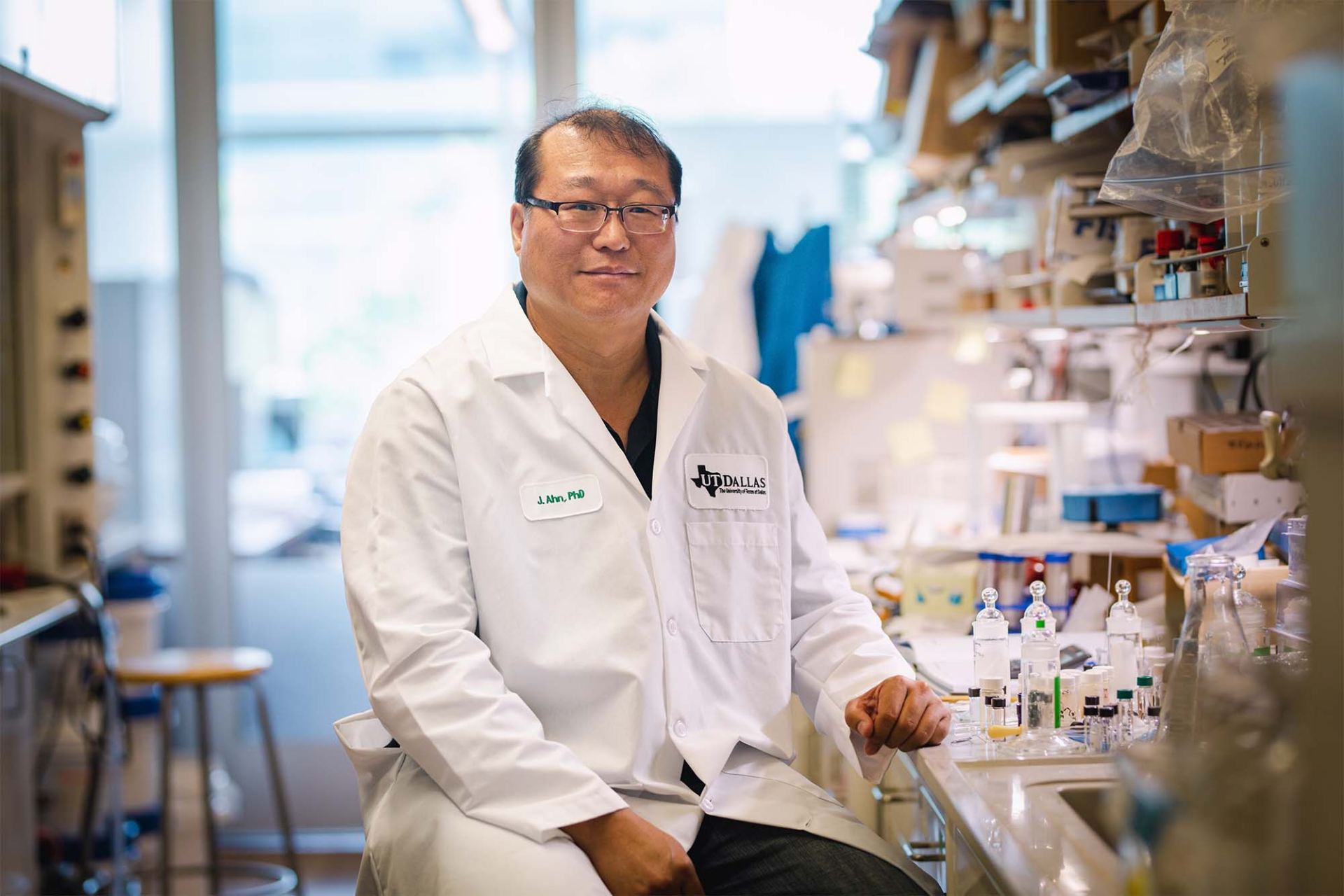Scientists Discover New Molecule That Kills Hard-to-Treat Cancers
By: Amanda Siegfried | June 9, 2022

A new molecule synthesized by a University of Texas at Dallas researcher kills a broad spectrum of hard-to-treat cancers, including triple-negative breast cancer, by exploiting a weakness in cells not previously targeted by other drugs.
A study describing the research — which was carried out in isolated cells, in human cancer tissue and in human cancers grown in mice — was published online June 2 in the journal Nature Cancer.
Dr. Jung-Mo Ahn, a co-corresponding author of the study and a UT Dallas associate professor of chemistry and biochemistry in the School of Natural Sciences and Mathematics, has been passionate about his work designing small molecules that target protein-protein interactions in cells for over a decade. Using an approach called structure-based rational drug design, he previously developed potential therapeutic candidate compounds for treatment-resistant breast cancer and for prostate cancer.

In the current work, Ahn and his colleagues tested a novel compound he synthesized called ERX-41 for its effects against breast cancer cells, both those that contain estrogen receptors (ERs) and those that do not. While there are effective treatments available for patients with ER-positive breast cancer, there are few treatment options for patients with triple-negative breast cancer (TNBC), which lacks receptors for estrogen, progesterone and human epidermal growth factor 2. TNBC generally affects women under 40 and has poorer outcomes than other types of breast cancer.
“The ERX-41 compound did not kill healthy cells, but it wiped out tumor cells regardless of whether the cancer cells had estrogen receptors,” Ahn said. “In fact, it killed the triple-negative breast cancer cells better than it killed the ER-positive cells.
“This was puzzling to us at the time. We knew it must be targeting something other than estrogen receptors in the TNBC cells, but we didn’t know what that was.”
To investigate the ERX-41 molecule, Ahn worked with collaborators, including co-corresponding authors Dr. Ganesh Raj, professor of urology and pharmacology at the Harold C. Simmons Comprehensive Cancer Center at UT Southwestern Medical Center, as well as Dr. Ratna Vadlamudi, professor of obstetrics and gynecology at UT Health San Antonio. Dr. Tae-Kyung Lee, a former UTD research scientist in Ahn’s Bio-Organic/Medicinal Chemistry Lab, was involved in synthesizing the compound.
The researchers discovered that ERX-41 binds to a cellular protein called lysosomal acid lipase A (LIPA). LIPA is found in a cell structure called the endoplasmic reticulum, an organelle that processes and folds proteins.
“For a tumor cell to grow quickly, it has to produce a lot of proteins, and this creates stress on the endoplasmic reticulum,” Ahn said. “Cancer cells significantly overproduce LIPA, much more so than healthy cells. By binding to LIPA, ERX-41 jams the protein processing in the endoplasmic reticulum, which becomes bloated, leading to cell death.”
“Triple-negative breast cancer is particularly insidious — it targets women at younger ages; it’s aggressive; and it’s treatment resistant. I’m really glad we’ve discovered something that has the potential to make a significant difference for these patients.”
Dr. Jung-Mo Ahn, associate professor of chemistry and biochemistry in the School of Natural Sciences and Mathematics
The research team also tested the compound in healthy mice and observed no adverse effects.
“It took us several years to chase down exactly which protein was being affected by ERX-41.” Ahn said. “That was the hard part. We chased many dead ends, but we did not give up.
“Triple-negative breast cancer is particularly insidious — it targets women at younger ages; it’s aggressive; and it’s treatment resistant. I’m really glad we’ve discovered something that has the potential to make a significant difference for these patients.”
The researchers fed the compound to mice with human forms of cancerous tumors, and the tumors got smaller. The molecule also proved effective at killing cancer cells in human tissue gathered from patients who had their tumors removed.

To learn more about how UT Dallas is enhancing lives through transformative research, explore New Dimensions: The Campaign for UT Dallas.
They also found that ERX-41 is effective against other cancer types with elevated endoplasmic reticulum stress, including hard-to-treat pancreatic and ovarian cancers and glioblastoma, the most aggressive and lethal primary brain cancer.
“As a chemist, I am somewhat isolated from patients, so this success is an opportunity for me to feel like what I do can be useful to society,” Ahn said.
Ahn is a joint holder of patents issued and pending on ERX-41 and related compounds, which have been licensed to the Dallas-based startup EtiraRX, a company co-founded in 2018 by Ahn, Raj and Vadlamudi. The company recently announced that it plans to begin clinical trials of ERX-41 as early as the first quarter of 2023.
Ahn’s research on this project is supported by the National Cancer Institute, part of the National Institutes of Health (1R01CA223828); the Cancer Prevention and Research Institute of Texas; and The Welch Foundation.
In addition to researchers from UT Southwestern and UT Health San Antonio, other study authors from Howard Hughes Medical Institute’s Janelia Research Campus, Northwest A&F University in China and the Medical College of Xiamen University in China contributed.
Media Contact:
Amanda Siegfried, UT Dallas, 972-883-4335, amanda.siegfried@utdallas.edu, or the Office of Media Relations, UT Dallas, (972) 883-2155, newscenter@utdallas.edu.





